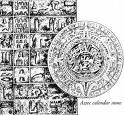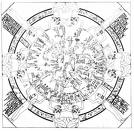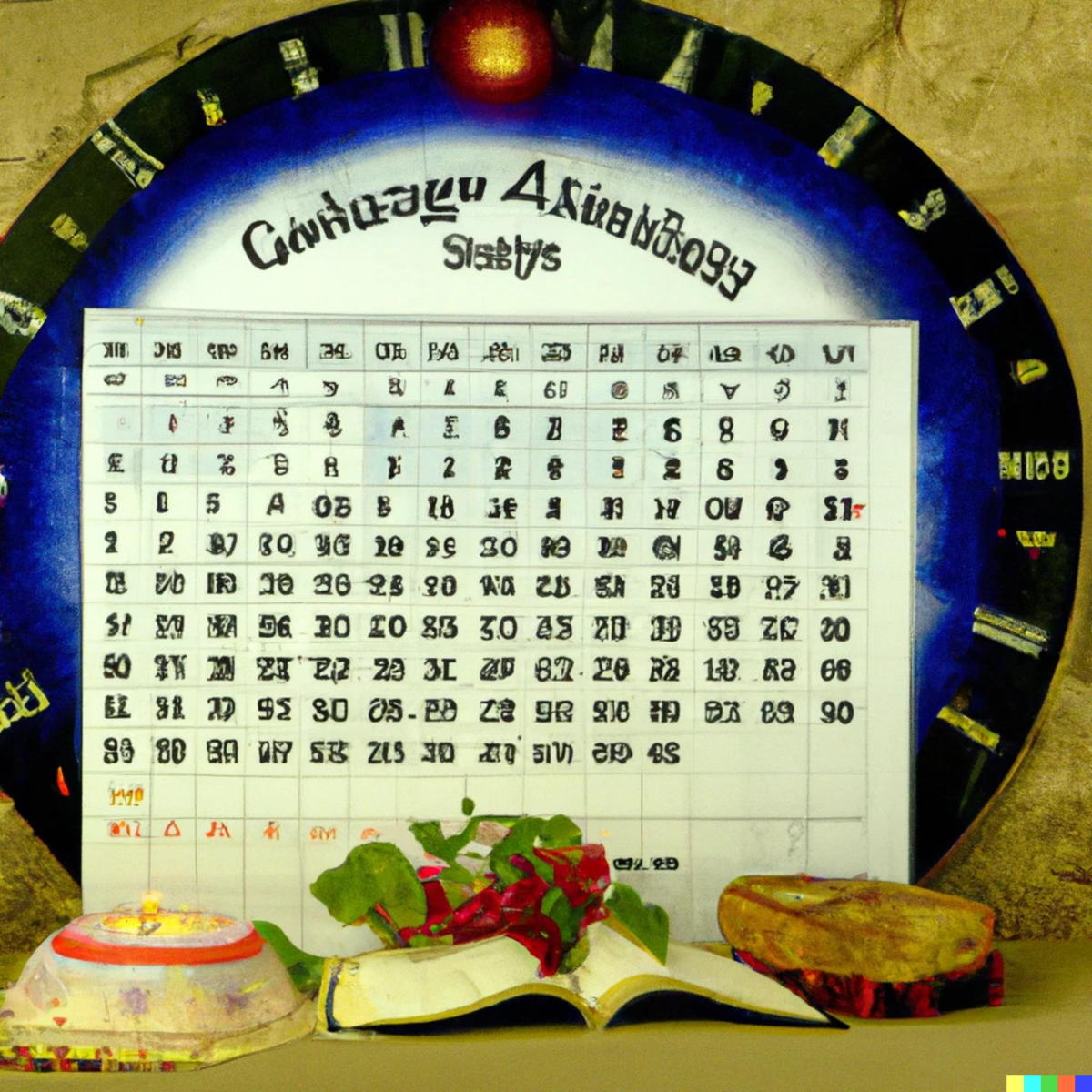The Calendar: time speeds up!
No-where in all the research I have done about calendars does it point out when time starts to speed up.
Like everyone worldwide is doing and has done for thousands of years I use a calendar to plan my days, weeks, months and years. All of life's events, meetings for work, appointments, holidays, all plans for the future are set onto a calendar.
Accomplished milestones determine our personal calendars, display our worth or time spent. Our birth, our first steps, first day of school, 13th birthday, high-school, drivers license, first date, marriage, first...second...third child, your children leaving home one at a time, etc (did you notice the speeding up of time here?)
All important marks are set against the backdrop of one day passing after another. Each and every event, great or small, personal or public , has it's day, month and year which fixes itself into that particular place in time.

Little or no thought at all goes into the beginnings of the calendar itself even though its as
colorful as history itself. The roots of the calendar can be traced back over 6000 years to the ancient Egyptians. The civilization that bequeathed us some of the greatest
wonders of the world also gave us the very bases of the calendar, which we still use today.
Although this forerunner of calendars was set up based on the movements of the Sun alone the ancient Egyptians did not take the moons movements into account at all. Everything the ancients did 'rotated' around the sun (pun intended).
They were the first 'farmers' (from what historians have gathered) and as such they used the movements of the sun to determine the length and the repeat of the cycles of the seasons - Spring, Summer, Autumn, Winter. These seasonal changes were to become known to the astronomers as the tropical year and they were able to measure, even without the sophisticated tools that were to come in the future, very precisely that a year took 365.2422 days long to pass.
some of my thoughts
Did you see any evidence or warnings about time speeding up? Where in any of the Egyptian writings does it say that after an individual has seen 36.52422 of those rotations around the sun that things will speed up? That time will fly by faster from then on ??? Does it say anywhere that the passing of those 365.2422 day units will now take 2-5% less time???
Not that I found yet. Maybe later on in the calendars history? Is this speeding up a one time affair, or heaven forbid just the beginnings of gradual acceleration?

For thousands of years this Egyptian calendar was to be the only civil time measure in the ancient world in which the length of each day, month and year was fixed and as such is the forerunner of our modern calendar.
Let me back pedal a bit; a calendar begins with astronomy, with
the Sun, the Earth and the Moon. Better said it begins with seconds,
hours, sunrise to sunset, the length of the
day, the lunar month, the year.
just more of my thoughts:
.....how sad would it be for the historians if there was no calendar...no calendar to mark all those special dissect-able events onto...no history...no historians...no history books...no past......

In waltz the Romans... About the eights century B.C.E. or so ago they determined that lives were governed by the cycle of night and day, the waxing and waning of the Moon and the passage of the seasons. And as such, started to measure the lunar month by the phases of the Moon - New Moon, First Quarter, Full Moon, Last Quarter, then back to the beginnings again. However when this 'new age' Roman calendar was introduced it inaccurately was set up on only 304 days...spread out over 10 months. Martius, Aprilis, Maius, Junius, Quintilis, Sextilis, September, October, November, December. With the names of the last six months having been taken from the Roman language for five, six, seven, eight, nine and ten.
my two cents worth!
Shame on you Romans, for shame ... No fooling around with the calendar... unless you can add extra to the end product (a year taking twice as long to pass would be good... that would make me 28....yup I could live with that)

By 450 B.C.E. the months and seasons were totally out of sync. To make the calendar match the solar year Numa, the Roman ruler of the time proclaimed, all easy and uncomplicated that the additions of January at the end of the year and February at the beginning was necessary. And to make things still simpler a 23 day long month called Mercedinus was to be inserted between February 23 and 24 every other year. (now that's easy to work with)
A short 400 years later, the calendar was so messed up that winter started the first week in September.
Shortly before the time when good old Julius Caesar became Pontifex Maximus, the Roman Calippus, came up with the calculations that made 940 lunar months equal to 76 years, with each year being 365.25 days long.
By this time the calendar had slipped by almost three months with respect to the seasons. Julius Caesar was determined to fix it all. He played around with the calendar long enough that they actually named it the 'Julian' Calendar.
With the help of astronomer Sosigenes the calendar received a total makeover. In this Julian version of the calendar in 46 B.C.E. he got rid of Mercedina, the remaining 12 months each kept their names, He then divid up the days of the year 'evenly' by giving 4 month 30 days and 7 months 31 days except for February, which he gave 28 and a 29th day every 4 years.
Februarius(28 or 29), Martius (31), Aprilis(30), Maius(31), Junius(30), Quintilis(31), Sextilis(31), September(30), October(31), November(30), December(31) and Januarius(31). .
As can be seen apart from Quintilis and
Sextilis most of these names have stayed almost unchanged over two thousand plus years. Quintilis was the birth month of Julius Caesar so in his honor it's name was changed to Julius in 44 B.C.E and
Sextilis was renamed for the Emperor Augustus in 8 B.C.E.
This Julian calendar was observed without any further changes
until the great reform of Pope Gregory XIII in 1582. The Romans had a minor miscalculation they called a year 365.25 days however the accurate number should have been approximately 365.24238968 days long or 365
days, 5 hours, 48 minutes and 45.1875 seconds but changing
slightly every year.This eleven minutes 14 seconds or so discrepancy doesn't seem like much in real time but over centuries it sure adds up.
my input
...most likely something happened at the end of February which Julius Caesar did not want to be reminded of, hence giving that poor month only 28 day with an extra once every 4 years only...honestly how unfair was that division...
Obviously day following day, month following month, year after year has always been there with the calendar just giving 'Time' some frame work. Time can be broken up into units, the time it takes for the earth to rotate on its axis 'DAY', the time it takes for the moon to orbit the earth 'MONTH' and the time it takes for the earth to orbit the sun 'YEAR'.
This calendar has become the tool mankind is using to choreograph the perpetual intertwined dance of the Sun, Moon and Earth. It has served for two thousand years and no doubt will serve for another two thousand!
And still NO evidence of why and when the speeding up of the clock is to happen... Maybe I should look at a more modern place for this time acceleration...possibly the Royal Greenwich Observatory which is the focal point of accurate timekeeping will be able to explain this phenomenon.
- Humor? Idiosyncracies?
People are such creatures of habit. They all get used to a certain pattern of going about their business, and don't realize it. As a seasoned people-watcher I've noted quite a few peculiarities and they... - Will you admit to being superstitious?
Are you superstitious? Or do you believe all that stuff is just - Minimalism and Me
While in the dentist's waiting room I read in some Home/Deco magazine (it didn't look too old) that there were some studies done that compared us, North Americans to Europeans with regards to our living...
- 1 Year hub-versary!
October 22nd 2007 a day in history... my history that is, a year ago I found my new home away from home. HUBPAGES. To give you the long tour (the short one is just too boring ...I've always wanted to be a... - My Hot Picture Gallery---2 Year Hub-versary!
After long soul searching I decided if you can't beat them, join them. So here is my contribution to the HOT, HOT, HOT picture gallery. I promise there are even a few hot chicks included. To celebrate my...
pictures from www.sxc.hu









